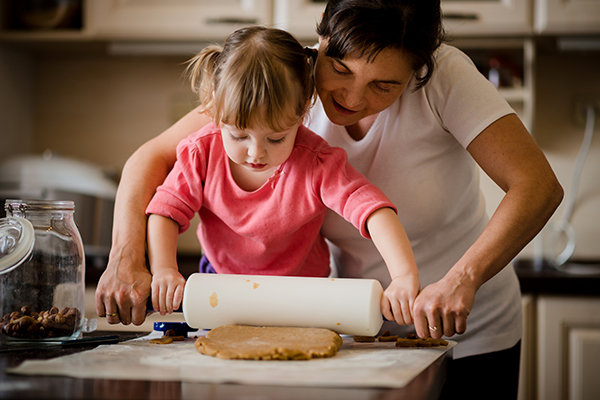
It is a great tragedy indeed that we are programmed even before we leave our mothers’ wombs. We quickly learn that, to show our worth, we must do certain things, be certain things and buy certain things. The greatest tragedy yet is perhaps the assumption that one’s worth is somehow tied to how much one owns. It is a programmed world.
Activists of the slow revolution argue that the world is in need of a voluntary simplicity revolution. As Duane Elgin asserts, voluntary simplicity is not about living in poverty; it is about living with balance.
Kim John Payne and Lisa Ross agree. In their book Simplicity Parenting, they advocate the elimination of distractions, clutter and stress. The authors contend that, in today’s busy and fast society, there’s too much stuff and too many choices. The book suggests that less leads to more and urges parents to adopt simplified parenting if they want their children’s individuality to flourish, and if they want to raise calmer and happier children.

Adopting simplicity voluntarily therefore means making a deliberate choice to live abundantly with less. It is the notion that more is not synonymous with better. There are myriad benefits of adopting voluntary simplicity when you have children:
1) You put more hours into your day. According to the authors of Simplicity Parenting, having less (fewer toys, fewer books, less clutter, fewer sounds, less light) helps parents “gain time, connectivity, security, and ease”.
2) Your children become more creative. Several studies agree that, the more toys children have, the less creative they are likely to be. Several researchers have proved that scarcity, rather than abundance, spurs creativity (you can read about some of these studies here and here).
3) You have more time to spend doing things that matter to you.

What Can You Do?
1) Clear the clutter. One way of reducing clutter is to reduce the number of toys your child owns. The 20-toy rule is about letting your child select only 20 toys and getting rid of the rest (for example by giving them away or selling them). The more toys your child has, the more likely he/she is to play with them less. It can be difficult for your child to give his/her toys away. Start small and begin with one thing at a time – toys, clothes, books. For instance, you can ask your child to select all the toys he/she doesn’t play with any more. You can also ask him/her to select all broken toys and put them aside. Another strategy is to ask your child to select his/her favourites. If your child is resistant, propose to keep the toys out of sight by storing them away. You can then let him/her exchange toys once in a while. It is important to include your child in the process.
2) Make meals predictable. One of the ideas I find totally awesome in the book Simplicity Parenting is making meals predictable. The authors suggest that families should choose one theme for each day of the week and stick to it weekly (pasta night, soup night, etc.). They argue that although teenagers may complain (it is indeed their job to do so!), adopting such traditions provides children with roots, and the meals are less demanding and easier to prepare.
3) Find pleasure in small things. Not everything has to be bought. Teach your child about the benefits of finding pleasure in simple things. Take him/her for walks. Encourage your child to make his/her own board games. Start fun family traditions that the whole family can participate in.
4) Make boredom constructive. Constructive boredom means providing an unstructured stimulating environment. Although it can be hard for both children and parents at the beginning, children provided with unstructured stimulating environments eventually find a way to use their creativity to amuse themselves. A study reported on the BBC about boredom found that providing these environments enables children to develop their creativity. Dr Belton, who led the study, argued that “children need to have stand-and-stare time, time imagining and pursuing their own thinking processes or assimilating their experiences through play or just observing the world around them.” To make boredom constructive, you must provide your child with an unstructured stimulating environment in order to arouse his/her creativity.
5) Control media and screen access
As one study recently found, children and young people have now become a valuable target market for advertisers. Never before has there been as much media content specifically designed for this target group. The impact has been swift. Several studies have observed interesting outcomes in countries across the world:
- Children exposed to too many advertisements are more likely to consider that the acquisition of products is the basis of determining one’s personal worth.
- The more children watched commercial television, the more toys they requested.
You can read about these studies here, here and here.
What Can You Do?
Keep track of what your children are exposed to on television and online. Remove temptations whenever possible.
Try positive distraction. For instance, you can encourage your children to watch more DVDs than television. Try less screen time yourself. For instance, you can choose one day a week where no one in the house is allowed to use TV or the Internet.
6) Be the example. Before you can talk to your kids about the benefits of living a simplified life, it is important that you show them by example. Reduce your clutter. Get rid of the stuff you neither need nor use. Explain to your child why it is important to donate. Explain to them why less clutter can be beneficial. Children learn best by example.

More resources on simplicity parenting:
Connecting with children by connecting with ourselves - Clinical psychologist + author, Shefali Tsabary, PhD
What is mindfulness? - Author + co-host of Zen Parenting Radio, Cathy Adams, LCSW
Understanding mindful parenting - Psychotherapist + author, Julie Wright, MFT



























